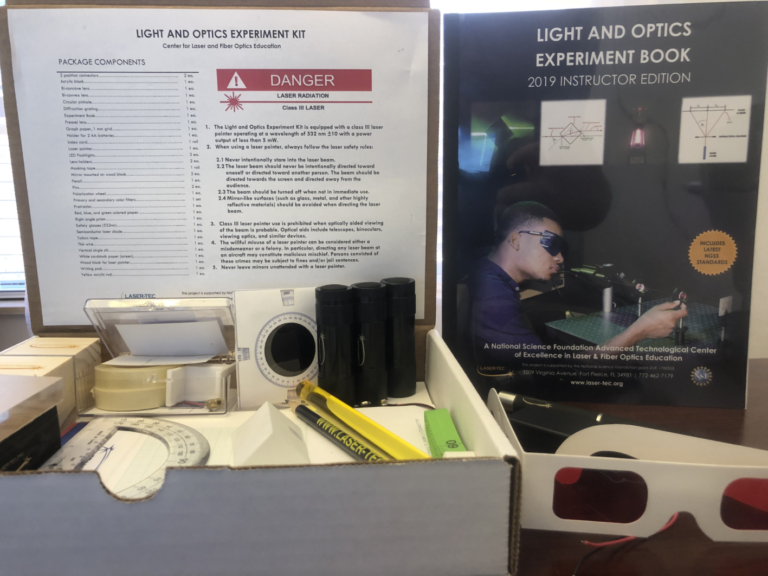/ Resources / Light and Optics Experiment Kit
The LASER-TEC Light and Optics Experiment Kit was designed to help students explore laser safety, the basics of lasers, fundamental topics of geometric and wave optics. At a great price, this kit provides all necessary tools and materials to conduct 23 experiments. Each kit includes the Experiment Book which includes 23 laboratories and provides step-by-step student guidance in their experiment-based investigation of optics and lasers.
We recommend using the kit in:
- Colleges and Vocational Schools & Intro to Photonics/Lasers courses
- High School Physics courses
- High School AP or Honor Physics courses
- CTE STEM Academies
We would like to receive your feedback as you use the Light and Optics Experiment Kit. This will help us to improve the contents of the kit and the experiment procedures.
- LASER SAFETY
- SEMICONDUCTOR LASER DIODE BASICS
- THE LAW OF REFLECTION
- THE LAW OF REFRACTION
- FINDING THE SPEED OF LIGHT IN AN ACRYLIC BLOCK
- TOTAL INTERNAL REFLECTION
- LASER BEAM STEERING WITH A RIGHT-ANGLE PRISM
- OPTICAL FILTERS
- DIFFUSE AND SPECULAR REFLECTIONS
- SIMPLE PERISCOPE
- MEASURING LASER BEAM DIAMETER AND DIVERGENCE
- MEASURING THE FOCAL LENGTH OF A BICONVEX LENS
- MEASURING THE FOCAL LENGTH OF A BICONCAVE LENS
- MEASURING THE FOCAL LENGTH OF A FRESNEL LENS
- BEAM-EXPANDING COLLIMATORS
- REFLECTIONS FROM AN OPTICAL WINDOW OF FINITE THICKNESS
- DETERMINING LASER WAVELENGTH USING GRATING
- THE SPECTRUM OF WHITE LIGHT
- INTERFERENCE AND DIFFRACTION THROUGH A PINHOLE
- INTERFERENCE AND DIFFRACTION THROUGH A SLIT
- MEASURING THE DIAMETER OF HUMAN HAIR USING DIFFRACTION
- OPTICAL ALIGNMENT TECHNIQUES
- CARE AND CLEANING FOR HIGH-GRADE OPTICAL COMPONENTS
Acrylic block (1 ea.)
Alignment cards (8 ea.)
Bi-concave lens (1 ea.)
Bi-convex lens (1 ea.)
Circular pinhole (1 ea.)
Cleaning set: Q-tips (5ea.), cleaning pads (4ea.), tweezers, finger cots (4ea.)
Diffraction grating (1 ea.)
Experiment book (1 ea.)
Fresnel lens (1 ea.)
Graph paper, 1 mm grid (1 ea.)
Index card (1 ea.)
Laser module with 3V power supply, 650 nm (1 ea.)
LED flashlights (3 ea.)
Lens holders (2 ea.)
Masking tape (1 roll)
Measuring tape (1 ea.)
Mirror mounted on wood block (2 ea.)
Pencil (1 ea.)
Pins (2 ea.)
Polarizing film (2 ea.)
Primary and secondary color filters (1 set)
Protractor (1 ea.)
Right angle prism (1 ea.)
Safety glasses for 650nm laser radiation (1 ea.)
Semiconductor laser diode without casing (1 ea.)
Stand for light sources (3 ea.)
Thin wire (gauge 30) (1 ea.)
Vertical single slit (1 ea.)
White cardstock paper (screen) (1 ea.)
Yellow acrylic rod (1 ea.)

Front Cover
Interference and Diffraction Through a Pinhole Lab
Semiconductor Laser Diode Basics Lab
Example of a Step-by-step Procedure
- The Light and Optics Experiment Kit is equipped with two class III diode lasers operating at a wavelength of 650 nm ±10 with a power output of less than 5mW.
- When using a laser, always follow the laser safety rules:
- Never intentionally stare into the laser beam.
- The laser beam should never be intentionally directed toward oneself or directed toward another person. The beam should be directed towards the screen and directed away from the audience.
- The beam should be turned off when not in immediate use.
- Mirror like surfaces (such as glass, metal and other highly reflective materials) should be avoided when directing the laser beam.
- Class III laser pointer use is prohibited when optically aided viewing of the beam is probable. Optical aids include telescopes, binoculars, viewing optics, and similar devices.
- The willful misuse of a laser pointer can be considered either a misdemeanor or a felony. In particular, directing any laser beam at an aircraft may constitute malicious mischief. Persons convicted of these crimes may be subject to fines and/or jail sentences.
- Never leave minors unattended with a laser pointer.
Discounts are available for orders of 50 kits or more. Contact us at info@laser-tec.org for details.




